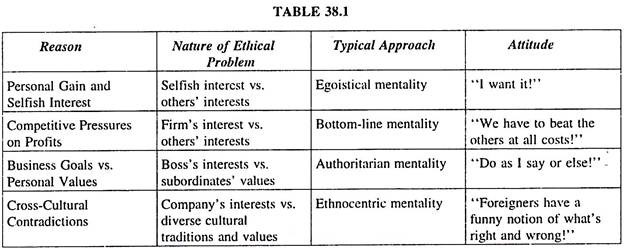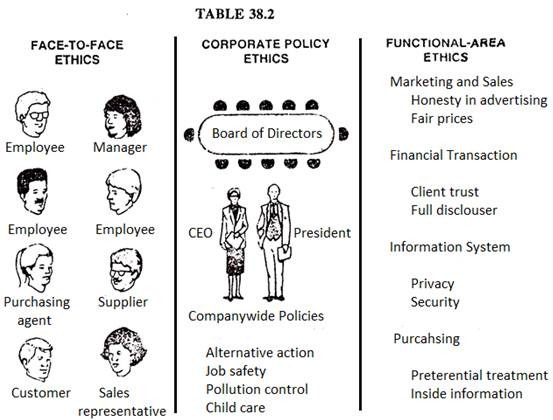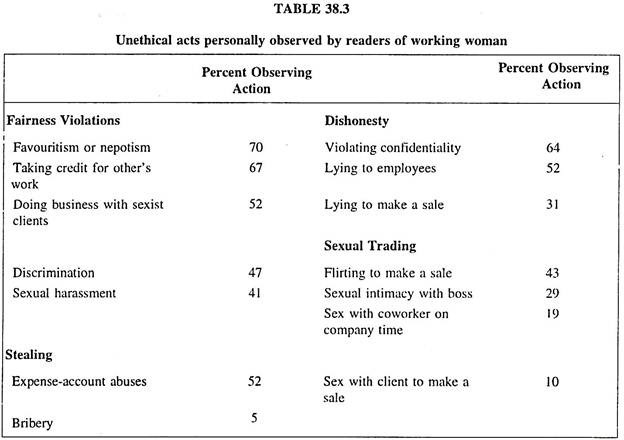Here is a compilation of term papers on ‘Business Ethics’ for class 11 and 12. Find paragraphs, long and short term papers on ‘Business Ethics’ especially written for school and college students.
Term Paper on Business Ethics
Term Paper Contents:
- Term Paper on the Introduction to Business Ethics
- Term Paper on the Need for Professional and Business Ethics
- Term Paper on the Need for Business to be Ethical
- Term Paper on Ethical Dilemmas in Business
- Term Paper on Ethical Problems in Business
- Term Paper on the Ethics Issues in Business
- Term Paper on How to Make Business Ethical
- Term Paper on the Codes of Business and Professional Ethics Codes of Ethics
- Term Paper on Ethics Training Programs
Term Paper # 1. Introduction to Business Ethics:
Business ethics is the study of the moral problems that confront members of business organizations and others who are engaged in business transactions. Business ethics is the application of general ethical ideas to business behaviour. Business ethics is not a special set of ethical ideas different from ethics in general and applicable only to business.
ADVERTISEMENTS:
If dishonesty is considered to be unethical and immoral, then anyone in business who is dishonest with employees, customers, stockholders, or competitors is acting unethically and immorally. If protecting others from harm is considered to be ethical, then a company that recalls a dangerously defective product is acting in an ethical way. To be considered ethical, business must draw its ideas about what is proper behaviour from the same sources as everyone else.
Business should not try to make up its own definitions of what is right and wrong. Employees and managers may believe at times that they are permitted or even encouraged to apply special or weaker ethical rules to business situations, but society does not condone or permit such an exception. People who work in business are bound by the same ethical principles that apply to others. What executives from 300 U.S. and non-U.S. corporations consider to be ethical issues in business.
Nearly half (45 per cent) of the issues involve employee relations in other words, the way people interact with each other and are treated on the job. About one-fifth of the issues deal with customer relations. Community ethical concerns account for another one-fifth of the list.
These same executives, when asked to name the ethical issues they believed would be very important in the following years, identified six as particularly important:, environmental issues (86 per cent said it would be a serious or critical issue), product safety (78 percent scored it serious or critical), employee health screening (77 per cent), security of company records (73 per cent), shareholder interests (70 per cent), and workplace safety (70 per cent).
Term Paper # 2. Need for Professional and Business Ethics:
ADVERTISEMENTS:
The need for a set of generally accepted and practiced standards of personal conduct is evident in all parts of the world. The need is plainly evident in the conduct of heads of state, politicians, judges, professors, doctors, lawyers, accountants, and just plain workers.
This situation is distressing because we really cannot be sure what ethical standards will guide the conduct of the person we vote for, of a lawyer, of the judge who tries a case, of the teacher of our children, of the doctor who does an operation, of the labour-union leader, of a business owner we deal with, or even of our neighbour.
In the United States, the assumption is chiefly made that others will abide by the same principles as one’s self. To a considerable extent, this is all to the good because it assumes a certain degree of commonality of ethical standards. But care must be taken. The uncertainty concerning another’s ethical standards establishes a situation in which we learn of them through trial and error.
In the world as it stands today, relationships are worldwide in scope. We make treaties with unknown heads of state and commercial agreements with distant and often foreign strangers; we send our children to distant colleges to be instructed by unknown professors. In these and many similar situations, trial-and-error methodology is often disastrous.
Term Paper # 3. Need for Business to be Ethical:
ADVERTISEMENTS:
Why, should business be ethical? What prevents a business firm from piling up as many profits as it can, in any way it can, regardless of ethical considerations?
The reasons for the above are as follows:
A business need to be ethical, in order to:
(1) Fulfill public expectations for business. The business shall gain widespread public- approval and nourish.
ADVERTISEMENTS:
(2) Prevent harming others i.e., its employees, and public in general. A company that is careless in disposing of toxic chemical wastes that cause disease and death, if adheres to ethical principles of conduct can definitely do good to society.
(3) Improve business relations and employee productivity. Being ethical imparts a sense of trust amongst business partners, firm and its employees and the firm and the public. In 1994 Malaysian government gave a cold shoulder to French executives because of the reason that the chairman of the French firm was in jail at that time.
(4) Protect business firms from abuse by its unethical employees and unethical competitors. Not only customers steal products from the departmental stores, their employees also do it. Store owners admit they are often at the mercy of the employees honesty.
(5) High ethical performance of a business enterprise also protects people who work in it. For example, they shall not be compelled to falsify an accounting report, etc. Businesses that treat their employees with dignity and integrity reap many rewards in the form of high morale and improved productivity. It is a win-win-win situation for the firm, its employees, and society.
ADVERTISEMENTS:
(6) A final reason for promoting ethics in business is a personal one. Most people want to act in ways that are consistent with their own sense of right and wrong. Being pressured to contradict their personal values creates much emotional stress. Knowing that one works in a supportive ethical climate contributes to one’s sense of psychological security. People feel good about working for an ethical company because they know they are protected along with the general public.
Term Paper # 4. Ethical Dilemmas in Business:
In some business situations, it is really difficult to decide what is right and what is wrong. For example, what should the company do if:
(1) Production manager of your competitor firm wants to join your firm and would tell you all the competitor’s plans for future.
(2) Sales personnel (of your firm) want that the product packaging should be changed and it should he mentioned thereon new and improved whereas there is no change in the product (which may be a hair dye, tooth paste or a shaving cream).
ADVERTISEMENTS:
(3) Your assistant recommends sending a colour T.V. to the purchase manager of another firm which buys raw material from you.
(4) Your chemist says that your anti-dandruff shampoo shall be sold more if you label such instructions on the pack that use at least two times for results.
Term Paper # 5. Ethical Problems in Business:
Ethical problems appear in business in many different forms and frequently. Finding out just what is responsible for causing them is one step that can be taken toward minimizing their impact on business operations and on the people affected. Some of the main reasons in this connection are given below in Table 38.1.
Term Paper # 6. Ethics Issues in Business:
There are three types of ethical issues:
ADVERTISEMENTS:
(a) Face-to-face ethics.
(b) Corporate policy ethics.
(c) Functional-area ethics. (refer Table 38.2)
(a) Face-to-Face Ethics:
ADVERTISEMENTS:
There is a human element involved in most business transactions. Manager, employee, supplier, purchasing agent, sales representative etc., all meet face-to-face in the business, because business is composed of human interactions which may be about their family or colleagues in the factory or their products etc.
Studies have shown that managers and employees commonly encounter face-to-face ethics issues/everyday moral issues as they go about their work. Observations of unethical acts by a predominantly female group of employees are given in Table 38.3.
(b) Corporate Policy Ethics:
Companies are sometimes faced with ethical issues that affect their operations across all departments and divisions of the firm.
Top managers and the board of directors then are faced with establishing companywide policies to cope with the issues, such as the following:
ADVERTISEMENTS:
“Even though our company is not a government contractor and does not receive any federal government funds, should we recruit S.C., S.T., or backward area persons in our firm as government concerns do?”
(c) Functional-Area Ethics:
Because business operations are highly specialized, ethics issues can appear in any of the major functional areas of a firm, as shown in Table 38.2.
Term Paper # 7. How to Make Business Ethical:
Making business ethical, involves the following three steps:
(i) Drawing up a company policy or code of ethics.
(ii) Making all employees familiar with this code.
ADVERTISEMENTS:
(iii) Implementing this code by means of a formally designated ethics committee.
(i) Drawing up the Code of Ethics:
The code of ethics should be drafted after carrying out discussions at all levels of organisational hierarchy and cooperation and consent of all employees should be obtained before finalising the code.
(ii) Familiarising the Employees:
To familiarise the employees with the code of ethics, its printed copies should be given to all the employees.
(iii) Implementing the Code:
ADVERTISEMENTS:
The company should implement the code with all genuine interest and sincerity. Let every employee know any unethical behaviour shall not be tolerated and suitable action shall be taken against erring employees.
An ethics committee having directors as its members should be constituted to monitor the ethical conduct of employees at all levels and take remedial action wherever deviations are noticed. Social audit may be conducted to ensure that the code is implemented and its contents are adhered to.
Term Paper # 8. Codes of Business and Professional Ethics Codes of Ethics:
Their purpose is to provide guidance to managers and employees when they encounter an ethical dilemma. A typical code discusses conflicts of interest that can harm the company (for example, guidelines for accepting or refusing gifts from suppliers, hiring relatives, or having an interest in a competitor’s firm).
Rules for complying with various laws, such as antitrust, environmental, and consumer protection laws; also are popular code provisions. The most effective codes are those drawn up with the cooperation and widespread participation of employees. An internal enforcement mechanism, including penalties for violating the code, puts teeth into the code.
A shortcoming of many codes is that they tend to provide more protection for the company than for employees and the general public. They do so by emphasizing narrow legal compliance—rather than taking a positive and broad view of ethical responsibility towards all company stakeholders—and by focusing on conflicts of interest that will harm the company.
Business and Professional Codes:
ADVERTISEMENTS:
Another phenomenon that has some potential in the area of furthering ethical practices is the rather widespread tendency of business groups, professional people, and even politicians to adopt or to consider the adoption of codes of conduct.
Examples abound in the codes adhered to by the medical, legal, and accounting professions; the many business codes usually developed by trade associations; and the various proposals for codes to govern the conduct of professors, politicians, and legislators.
Purpose:
The usual reasons for the development of these codes are two. In the first place, it is considered that the publication of a code of ethics will improve the confidence of customers, clients, patients, or voters in the quality of service they may expect.
This is why education, which is presumed to be the best safeguard against quackery, is stressed. So also are truth-in-advertising, something more than caveat emptor, conflicts of interests, and similar matters covered in the codes.
A second reason for the development of this practice concerns the interrelationships of the members themselves. Business simply cannot be carried on in its present complexity without trust in the ethical standards of vendors and suppliers, of financial houses, and of government agencies. It is believed that their business risks will be somewhat minimized if the competitors within the group, and between groups, can rely upon at least some expectation of a given standard practice.
It is believed that there are two additional reasons for codes. They can be used as a crutch for the weak, who, if approached to undertake some unethical act, can point to the code to underwrite their refusal. And then there is the practical result that codes simplify the detection of unethical behaviour in competitors and employees.
Chief Provisions of a Professional Code:
An example of the chief provisions of a code for professional accountants is given below in summery form. On the same lines, codes can be framed for other professionals.
A. Professional conduct:
1. An appropriate firm name, style, and description.
2. Practice as a corporation is forbidden.
3. Occupations incompatible with public accounting are prohibited.
4. If engaged in another business, the same rules of conduct apply.
5. Advertising and solicitation of business are prohibited.
6. Members of the Institute of Accountants must observe the rules of State societies, where they exist, on competitive bidding.
7. Offers of employment to employees of other accountants are forbidden.
B. Confidence of clients:
1. Confidential relationship must not be violated.
2. Splitting fees with, or paying commission to, the laity is forbidden.
3. Excepting partners and employees, members may not permit others to use their names on financial documents.
4. Members may not sign the work of others, excepting their own associates or other accredited accountants.
C. Confidence of third parties:
1. Members must conform to generally accepted accounting and auditing standards in certifying statements.
2. Contingent fees relating to audits are prohibited.
3. Members must not vouch for the accuracy of earnings forecasts.
4. Members may not express an opinion on financial statements of an enterprise financed by public issues of securities if they, or their immediate relatives, have a substantial financial interest. With private financing, their interests must be exposed.
Term Paper # 9. Ethics Training Programs:
Many companies provide ethics training for their managers and employees. After all, firms frequently train their employees in accounting methods, marketing techniques, safety procedures and technical systems, so why not also give them training in ethics?
The two most common approaches for establishing a training program in ethics are:
(1) Developing employee awareness of ethics in business, and
(2) Drawing attention to ethical issues to which an employee may be exposed.
Nearly all ethics training programs include messages from the chief executive officer, discussion of codes of ethics, and procedures for discussing or reporting unethical behaviour. Numerous approaches are used to promote ethical awareness and decision making: case studies, corporate rules or guidelines, decision frameworks (such as the Golden Rule or ethical principles), and approaches which attempt to develop higher stages of moral reasoning. Most of the corporate ethics training programs are permanent modules in the employee training curriculum, with a majority offered to all managerial employees.
Communicating Ethical Values:
Every day management is faced with a series of ethical questions. These are concerned with treatment of personnel, safety in the work place, pollution control, minority employment, relations with customers, and a wide range of financial matters involving investors and the financial community. One of the toughest dilemmas facing managers today may be how to communicate ethical values to their employees.
Some suggestions in this connection are given below:
Create an open environment in the work place that makes employees feel comfortable in bringing problems or ethical dilemmas to superiors. Be consistent and reward ethical behaviour. For example, do not tell employees that you want an ethical environment at work and then issue an ultimatum: “The quarterly profit goals had better be reached, or else.” Ask questions on value-related issues when visiting offices or factories.
Include criteria in performance-evaluation systems that incorporate performance according to key ethical values. Prepare a statement of the values or “way” certain kinds of business problems should be handled. Use employee publications and other media to demonstrate and reinforce key values. Establish special ethics training or integrate such discussions into existing programs. Instruct by a good personal example.
Role of Professional Bodies:
Professional associations, like Institution of Engineers (India), Indian Institute of Welding, Indian Institute of Materials Management, etc., can strive a great deal to influence the thinking of professionals on ethical lines. They can play a significant role in promoting the professional image, as these associations act as the beacon light for the professionals.
Being voluntary organizations, the full benefits can be reaped only by the efforts of individual members. It would not be out of place, to quote here the biblical St. Mathew 16-26 quotation, “For what is a man profited, if he shall gain the whole world and lose his own soul!”


